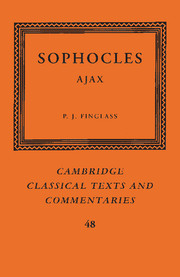Commentary
Published online by Cambridge University Press: 05 June 2012
Summary
Dindorf (1825 edn) restored this title in place of manuscript Αἴας Μαστιγοϕόρος. The hypothesis (printed in Pearson's edition) states that the Διδασκαλίαι (a list of plays performed at Athens compiled by Aristotle) designate it simply as Αἴας (Arist. fr. 623 Rose). According to the same source, Dicaearchus (a pupil of Aristotle, who wrote hypotheses to S.'s plays) called the play Αἴαντος θάνατος (fr. 79 Wehrli). The hypothesis attributes the epithet Μαστιγοϕόρος to Ajax's whipping of the ram which he believes to be Odysseus, or to a desire to distinguish the drama from S.'s play Αἴας Λοκρός.
The latter reason is correct. The same occurs with other homonymous pairs by the same author, such as Sophocles’ Oedipus dramas (later distinguished as Τύραννος and Κολωνεύς) and Euripides’ Hippolytus (Στεϕανηϕόρος and Καλυπτόμενος) and Iphigenia plays (ἡ ἐν Ταύροις and ἡ ἐν Αὐλίδι). But the scholiast's explanation needs refinement. West (1979a) 131 = M. Lloyd (2007) 361–2 points to the visual emphasis of our title and the titles of the Hippolytus plays: ‘such names will not have originated with scholars who knew the plays mainly from reading but with people who knew them as spectacles’. He ascribes them to the book trade; someone buying or selling a copy of a play with a homonymous counterpart by the same author needed a means of specifying which drama was meant. They would have come into existence in the late fifth and fourth centuries, but only informally and sporadically; Aristotle, for example, refers simply to Oedipus and Iphigenia in the Poetics without further specification (Sommerstein (2002a) 4 = (2010a) 14). The play which we know as S.'s Philoctetes probably acquired a sur-title, now lost, to distinguish it from Φιλοκτήτης ἐν Τροίᾳ (Sommerstein (2002a) 3–4 n. 10 = (2010a) 14 n. 10; perhaps ἐν Λήμνῳ?).
- Type
- Chapter
- Information
- Sophocles: Ajax , pp. 133 - 525Publisher: Cambridge University PressPrint publication year: 2011

